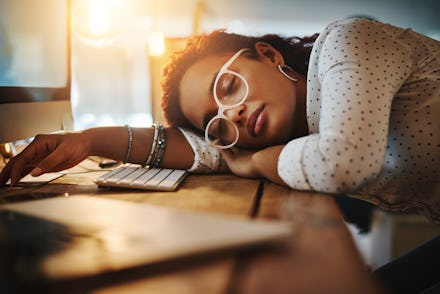The surprising link between anxiety and your newfound drowsiness

A few years ago, my therapist said something that’s stuck with me ever since: “Life is a little harder for you.” What she meant was that because of my generalized anxiety disorder, I need to constantly rein in my racing thoughts — the same ones that had likely kept me awake the night before. It’s exhausting, which could explain why grogginess so often weighs me down. But the intense stress of the pandemic has also left many of us depleted, whether we have an anxiety disorder or not. So how do you know if your sleepiness is a sign of an anxiety disorder or just regular old pandemic fatigue?
Before we wade in, let’s look at the relationship between anxiety disorders and sleepiness. Everyone’s anxiety disorder looks different, but many of those who live with one experience fatigue as a symptom, Tess Brigham, a marriage and family therapist in San Francisco, tells me. “You’re exhausted from the day, and then top of that, you’re not getting enough quality sleep.”
During the day, your mind might race, she explains, and adrenaline might constantly animate your body, whether through fidgeting or some other nervous tic. At night, you might stay up ruminating over something dumb you said, or what you need to accomplish tomorrow. Or maybe you doze off easily, but awaken in the middle of the night and struggle to fall back asleep.
Living in a pandemic has likely also tuckered you out, though, Brigham says. And why wouldn’t it? You’ve had to start wearing a mask, social distancing, and adopting a laundry list of other behaviors. All this time at home, not traveling, seeing loved ones, or engaging in the countless other activities you enjoy, is getting old. The endpoints you might’ve set haven’t stood the test of time, either. Maybe you thought the vaccine, a Biden victory, or the end of 2020 would signal the end of this shitshow. But the vaccines are taking a while to roll out, Biden isn’t a miracle worker, and 2021 feels an awful lot like 2020. Watching lawmakers disagree on pandemic relief and other issues is also frustrating. It's a lot.
Whether you have an anxiety disorder or pandemic fatigue, Brigham says “the feelings of anxiety are all the same,” which can make tracing the source of your sluggishness tricky. Try recalling when the sleepiness and other symptoms began. If you’ve had this pattern for years, it’s might be due to an anxiety disorder. When people get a formal diagnosis, their symptoms typically aren’t new. I’ve noticed mine since I was a kid, for example, but the pandemic has worsened them. On the other hand, if your symptoms have only surfaced since the pandemic began, they’re probably the result of pandemic fatigue.
That said, you might’ve been able to manage your anxiety on your own for years, Brigham says, until the pandemic pushed you over the edge. Sure, you might start to feel better once this all ends — but you might not, and that’s okay. “All the events that happen in our lives, they affect us, and so to try to think you can go back is impossible,” she explains. “Anybody who has been through anything in their life, they change.” As much as we yearn for life to return to normal, the fact remains that the pandemic has vastly changed us and our world. “You can either feel really bad about it, or you can figure out how to think about it differently.”
If you seek therapy for your anxiety, the treatment will look more or less the same regardless of whether the source is an anxiety disorder or the pandemic, according to Brigham. Learning to manage it will likely entail meditation or some other mindfulness practice to slow your mind so that you can simply notice your thoughts and feelings, without believing or reacting to them.
If you find yourself exhausted by everything right now, know that it’s totally normal, Brigham says. It doesn’t mean there’s anything wrong with you or that you’re not strong enough. Recognize and accept your feelings, reminding yourself that yes, this is tough. Also consider how you spend your days. Ask yourself what you need to do in order to bring yourself more joy, excitement, and inspiration, and whether you're falling into old habits that aren’t really serving you.
Take note of your sleep. Maybe don’t spend an hour doom scrolling before bedtime. Nap if you can during the day. Look to the quiet ritual of parents putting their kids to bed for guidance — the way they help them into their PJs, dim the lights, read to them.
And if none of this is working, it might be worth reaching out to a mental health professional, Brigham suggests, since there’s probably something more going on. Whatever you do, remember that you’re living through a historically tough time, and be kind to yourself.